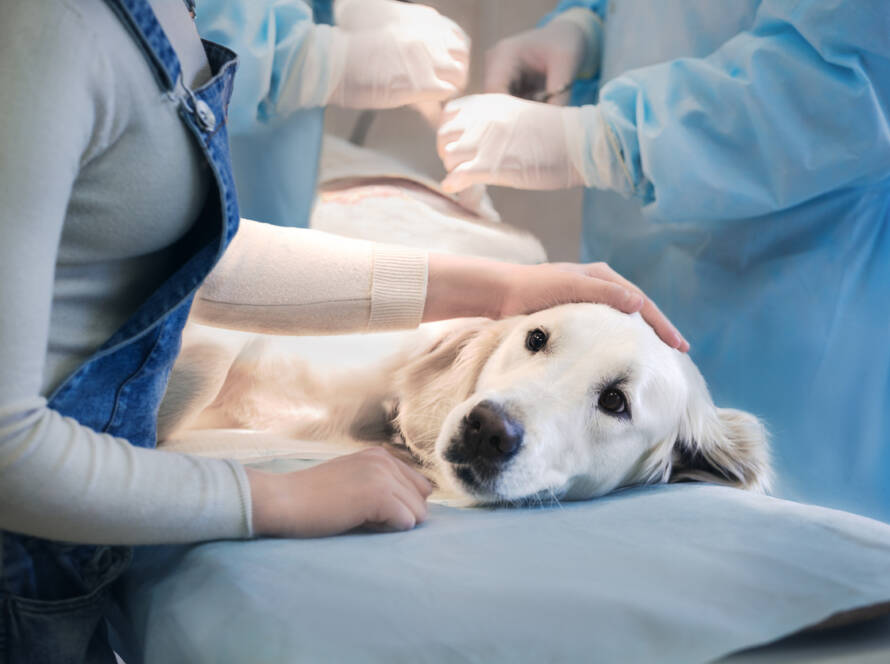Veterinarians across the U.S. dedicate August as National Pet Immunizations Awareness month to raise awareness of the importance of vaccinations for your pets. Vaccines protect your pet by triggering immune responses which prepare your pet’s immune system to fight disease-causing agents. In other words, they stimulate the immune system’s production of antibodies that identify and destroy disease-causing organisms that enter your pet’s body. Vaccines provide immunity against one or several diseases or can lessen the severity of illness.
5 reasons to vaccinate your pet
- Vaccinations prevent many pet illnesses.
- You can avoid costly treatments for diseases that vaccines can prevent.
- Vaccinations prevent diseases that can be passed between animals and from animals to people.
- Diseases prevalent in wildlife, such as rabies and distemper, can infect unvaccinated pets.
- In many areas, local or state ordinances require certain vaccinations of household pets. For example, it is Michigan law that dogs and ferrets must be vaccinated for rabies, and it is recommended that all cats and any domestic livestock in contact with the public be vaccinated if a licensed vaccine exists.
Do vaccinations ensure protection?
For most pets, vaccination will effectively prevent future diseases or decrease a disease’s severity. However, it is crucial to follow the vaccination schedule provided by your veterinarian to reduce the possibility of a gap in protection.
What are the risks of vaccinating your pet?
Most pets respond well to vaccines. Some pets may experience adverse reactions. The most common side effects to vaccination are mild and short-term. Severe reactions are rare. While uncommon, a serious adverse reaction in cats is a tumor (sarcomas), which can develop weeks, months, or even years after vaccination. Improvements in vaccine technology and technique have significantly reduced the occurrence of sarcomas.
While vaccines have associated risks, you should weigh the risks against the benefits of protecting your pet.
Puppy and kitten vaccinations
Very young animals are highly susceptible to infectious disease because their immune system is not yet fully mature. They receive protection through antibodies in their mother’s milk. Still, the defense is not long-lasting, and there may be gaps in protection as the milk antibodies decrease and their immune system is still maturing. Maternal antibodies can also interfere with a puppy’s or kitten’s vaccine response, so we recommend a series of vaccines to ensure that the puppy or kitten receives a vaccine as early as possible after maternal antibodies subside.
In many instances, the first dose of a vaccine primes the animal’s immune system against the virus or bacteria. Subsequent doses help further stimulate the immune system to produce the antibodies needed for long-term protection.
The importance of following your pet’s vaccination schedule
An incomplete series of vaccinations may lead to insufficient protection, making puppies and kittens vulnerable to infection. So, we urge pet parents to follow their pet’s vaccination schedule and ensure they finish the series for their pet.
Vaccinations are usually scheduled 3-4 weeks apart. For most puppies and kittens, we give the final vaccination at about four months of age; however, we may alter the schedule based on an individual animal’s risk factors.
Which vaccinations should my pet receive?
Core vaccines are vital to all pets based on exposure risk, disease severity, or transmissibility to humans. We recommended them for most pets in a particular geographical location because they protect from diseases most common in that area.
Non-core vaccinations are for individual pets with unique needs. Your veterinarian will consider your pet’s risk of exposure to various preventable diseases to customize a vaccination program for optimal protection throughout your pet’s life.
We will ask you questions about your pet’s lifestyle, including any expected travel to other geographical locations or possible contact with other pets or wild animals, since these factors can impact your pet’s risk of exposure to certain diseases. We will work with you to help you determine a vaccine schedule that is specifically tailored for your pet.
How often will my pet need to be vaccinated?
Many vaccinations provide adequate immunity when administered every few years, while others require more frequent schedules to maintain an acceptable level of immunity that will continually protect your pet. Your veterinarian will determine a vaccination schedule that’s appropriate for your pet.
What are antibody titers, and do they replace vaccinations?
Antibody titers are blood tests that measure the level of antibodies in the blood. While antibody titers do not replace vaccination programs, they may help us determine if your pet has a reasonable expectation of protection against disease.
Many factors are taken into consideration when establishing a pet’s vaccination plan. Your veterinarian will tailor a program of vaccinations and preventive health care that will help your pet maintain a lifetime of infectious disease protection.
Do vaccinations have side effects?
It is common for pets to experience some or all of the following mild side effects after receiving a vaccine, usually starting within hours of the vaccination. If these side effects last for more than a day or two or cause your pet significant discomfort, you need to contact us:
- Discomfort and local swelling at the vaccination site
- Mild fever
- Decreased appetite and activity
- Sneezing, mild coughing, “snotty nose,” or other respiratory signs may occur 2-5 days after your pet receives an intranasal vaccine.
More severe side effects, such as allergic reactions, may occur minutes to hours after vaccination. These reactions can be life-threatening and are medical emergencies. Seek veterinary care immediately if any of these signs develop:
- Persistent vomiting or diarrhea
- Itchy skin that may seem bumpy (“hives”)
- Swelling of the muzzle and around the face, neck, or eyes
- Severe coughing or difficulty breathing
- Collapse
- A small, firm swelling under the skin may develop at the site of a recent vaccination. It should start to disappear within a couple of weeks. If it persists for more than three weeks or seems to be getting larger, you should contact us.
Important note: Always inform us if your pet has had prior reactions to any vaccine or medication. If in doubt, wait 30-60 minutes following vaccination before taking your pet home.
Conclusion
There are a variety of diseases which affect our pets and other animals. This makes proper vaccination vital in protecting them from the many types of illnesses they are susceptible to. It’s important to consult with us about the unique risks of living in our region. We will be happy to discuss the benefits of protecting your pet with vaccinations, as well as provide you with information on the required vaccinations for your pet. Please contact us if you have any questions about your pet or their vaccination schedule.
Sincerely,
Schoolcraft Team


